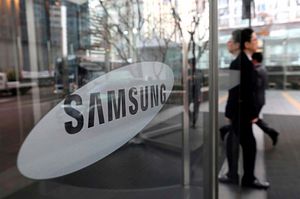As part of the bout of deadly heat waves spanning across the northern hemisphere right now, the Korean Peninsula is experiencing a type of weather pattern never felt before. This month, South Korea’s capital, Seoul, reached 39.6 degrees Celsius (103.28 Fahrenheit), the hottest temperature ever recorded in the past 111 years. Meanwhile, pictures of North Korean leader Kim Jong Un looking at things while out of his uniform “Mao” suit and stripped down to just an undershirt have been published by North Korean media.
Rather than sweltering, there is an opportunity here for governments and companies to turn things around, and South Korea has a strong ally to do something truly remarkable.
In June, Samsung Electronics, undoubtedly one of South Korea’s largest export brands, launched its first ever renewable energy strategy, with a commitment to use 100 percent renewable energy for its factories and operations in China, Europe, and the United States by 2020. As part of its commitments, the company agreed to install solar panels and geothermal power generation at three facilities in South Korea, as well as fully support the government’s national strategic plan to increase the country’s renewable energy use by 20 percent by 2030.
This is a significant move from one of the world’s biggest tech companies. In 2017 alone Samsung’s electricity consumption increased by almost 11 percent to a whopping 18,450 GWh, more than the annual power consumption of Iceland in 2015. In 2016, the tech giant used 66 percent of its worldwide electricity purely in South Korea, ranking as the country’s second-largest electricity consumer that year. If that power were to be sourced from renewables instead, it could help drive up demand, boost investment, and help South Korea transition its economy away from fossil fuels as quickly as possible.
As one of its first moves, Samsung plans to hit 20 percent renewable energy by 2020 — a great first step, considering that Samsung’s renewable energy consumption is currently operating at only 1 percent. But as ambitious as this sounds, Samsung has some heavy lifting to do in order to ensure that its renewable energy plan is implemented in an effective manner, to avoid any future criticisms of “green-washing” or of making blind commitments. One of the most important moves is for the company to find a new renewable energy supply locally and on the same grid where its operations are located. By doing so, it ensures that they are actually and directly using this electricity source, thus countering the need for coal or other dirty power sources. Samsung must also keep to its word to increase renewable energy around the world in the medium to long term, and eventually expand its 100 percent commitment to become a company-wide goal, including its supply chain.
With proper and effective planning, Samsung could play a part in radically changing energy policies within South Korea. In most places, there are not enough policies to support the corporate sourcing of renewable energy. But where monopoly utilities dominate, companies are increasingly working with power companies and policymakers to allow the purchasing of renewable energy at scale, either from the utility or from other service providers who are able to deliver a 100 percent supply of renewable energy. In 2012, Apple, Facebook, and Google worked together to advance policy changes that would open up the utility market in the U.S. state of North Carolina and were ultimately successful in creating a renewable energy tariff for large customers. Samsung can do the same in South Korea to prove its commitment and level of climate ambition.
As Earth is at risk of entering into a “hothouse” state, we need real leadership and ambitious action from both governments and companies now, more than ever. In October the Intergovernmental Panel on Climate Change (IPCC) will come to Samsung’s home country, South Korea, to release a crucial report following the landmark 2015 Paris climate agreement. The report is expected to have one clear message: Climate change is bad, it is urgent, but there is still a window of opportunity to turn things around with shared responsibility and ambitious action. This is exactly the kind of action Samsung could be poised to take. A move away from dirty old fossil fuels doesn’t just make sense for a company like Samsung and the reputation it has with its customers, it also makes business sense, putting them ahead of the curve for the inevitably necessary transition to renewable energy.
Insung Lee is the IT Campaigner from Greenpeace East Asia Seoul office.

































